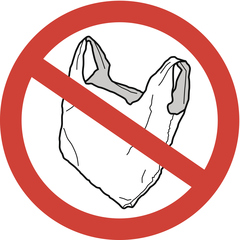
Our familiar plastic shopping bag, convenient as it may be, has become a serious environmental problem. Introduced in the 1970s, they are dispensed freely in many grocery stores. Plastic shopping bags are mostly made from either low-density or high-density poly-ethylene (LDPE, HDPE), which has a high strength-to-density ratio. Each year, an estimated 500 billion to 1 trillion plastic bags are consumed worldwide. A large share of them ends up in landfills, where they decay only slowly. However, a much bigger problem is that many bags make their way out into the ocean, where they float around and accumulate. Due to ocean currents, a large accumulation has appeared in what has become known as the Great Pacific Garbage Patch, 135–155°W and 35–42°N. These floating bags cause damage to marine life. On land, plastic bags in the sewage system can also clog up wastewater treatment facilities. The plastic bag has turned from a convenience of life into an environmental nuisance. Some jurisdictions have taken to banning plastic bags outright, while others rely on taxation. I am much in favour of the second option: put a price on the negative externality, and consumers will adjust and find alternatives. Some stores will offer paper bags, but these are not environmentally friendly either because of the resources they take to produce, even if trees are renewable. The best alternative is therefore reusable bags.
As of March 6, my local Save on Foods grocery store (owned by Overwaitea Food Group), has put a price on plastic bags. At 5 cents per bag, shoppers may find it beneficial to bring their own shopping bags. For small shopping trips, one or two reusable bags will do just fine for me. However, when I go shopping for my family's weekly supply of groceries, I bring along one or two collapsible crates. They are easy to carry along in my car as they don't take up much space. They are easy to unfold at the checkout counter, and once they have done their duty, they can be folded up again. If you are wondering what exactly I am talking about, here is a link to the CleverCrate® 46L Crates at Canadian Tire, which sell for $15 a piece there at the moment.
Transitioning to reusable bags will involve education for households and retailers alike. Households need to adapt to carrying reusable bags to stores, and possibly acquire some. Stores need to modify their checkout procedures and checkout counters so that purchased items can be put into reusable bags and crates easily. Most stores are not yet set up for that as the conveyor belts sit relatively high, with no lowered area for filling up bags and crates.
It is encouraging to sea that Overwaitea Food Group is charging a price for plastic bags. "Free" was always a bad idea for something that has both a private and a social cost. Let's hope that other grocery store chains fill follow suit.
![[Sauder School of Business]](logo-ubc-sauder-2016.png)
![[The University of British Columbia]](logo-ubc-2016.png)